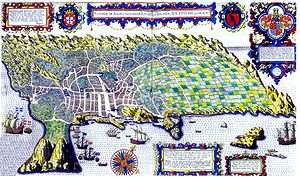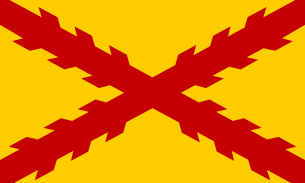- Conquest of the Azores
-
Conquest of the Azores Part of the War of the Portuguese Succession 
Map of the Terceira Island. By Jan Huygen van Linschoten.Date 2 August 1583 Location Terceira Island, Azores Islands Result Decisive Spanish victory[1][2] Belligerents  Kingdom of Portugal
Kingdom of Portugal
 Spain
Spain
(Under Philip of Spain)
Commanders and leaders  Prior of Crato
Prior of Crato Álvaro de Bazán
Álvaro de BazánStrength 9,200 men[4]
30 warships11,700 men[4]
96 warshipsCasualties and losses 9,000 dead or captured[1]
(Mostly prisoners)400 dead or wounded Lisbon – Oporto – Salga – Ponta Delgada – AzoresAnglo-Spanish WarSan Juan de Ulúa – Goes – Haarlem – Ponta Delgada – Terceira Island – Zutphen – 1st Cádiz – 1st Calais – Gravelines – Ireland – Bergen-op-Zoom – Coruña – Lisbon – Berlengas – Strait of Gibraltar – Flores – Craon – Cape Finisterre – Blaye – San Mateo – Crozon – Cornwall – Las Palmas – 1st San Juan – Pinos – 2nd Calais – 2nd Cádiz – Turnhout – Groenlo – Azores Voyage – 2nd San Juan – Nieuwpoort – Kinsale – Ostend - CastlehavenThe Conquest of the Azores, principally Terceira Island, took place on 2 August 1583, between the Portuguese loyal to the claimant Dom António, Prior of Crato, supported by French and English troops, and the Spanish-Portuguese forces loyal to King Philip commanded by the admiral Don Álvaro de Bazán during the War of the Portuguese Succession.
Contents
The Battle
Secure within his Lisbon base, the Marquis of Santa Cruz prepared an amphibious invasion force. This time his aim was not to fight a fleet but to land an army: the task force could certainly defend itself if necessary, but its primary role was to put troops, together with their supporting equipment and supplies, on a selected beach-head and then to back them up until the military objectives had been gained.
After only one day's fighting Terceira fell and the Spanish-Portuguese troops won an easy victory thanks to the good command of Don Álvaro de Bazán. The same day, the Spanish-Portuguese force landed in Faial, where they defeated and captured a garrison of five French and one English companies, 700 men all told.[3] The French and English soldiers on the islands were allowed to retire unharmed, but sixteen supporters of Dom António who had tried to flee on the night of the attack, were executed.
Dom António and a handful of his supporters were lucky to escape with their lives.[1]
Consequences
With the conquest of the Terceira Island, the Azores Islands were completely controlled by the Habsburg King, Philip II of Spain (Philip I of Portugal) and the war ended with the complete incorporation of the Kingdom of Portugal and its colonies into the Iberian Union.[2]
Dom António returned to France and lived for a time in Ruel, near Paris. Fear of spies, employed by Philip II of Spain, drove António from one refuge to another until he finally went to England.
Elizabeth I of England and her advisers viewed with trepidation the rising tide of Spanish victories (the conquest of the Azores Islands in the south and of the Flemish coast in the north) in 1583.
See also
 Flag of the Spanish armies under Philip II of Spain.
Flag of the Spanish armies under Philip II of Spain.
- War of the Portuguese Succession
- Iberian Union
- History of Portugal
- Anglo–Spanish War (1585)
- Timeline of Portuguese history (Third Dynasty)
Notes
References
- Parker, Geoffrey. The Spanish Armada .. Mandolin Publishing, Manchester University Press. ISBN 1901341-14-3
- Hakluyt Richard. Vogayes and discoveries Penguin Classics. London (1972).
- Konstam, Augus. The Armada Campaign (1588) - The great enterprise against England Osprey Publishing. ISBN 1-84176-192-3
- Walton, Timothy. The Spanish Treasure Fleets Pineapple Publishng (2002) ISBN 1-56164-049-2
- Jan Glete. Warfare At Sea 1500-1650; Maritime Conflicts and the Transformation of Europe ISBN 0-415-21454-8
- Brimancomble, Peter. All the Queen's Men - The World of Elizabeth I, London (2000). ISBN 0-312-23251-9
- History of Portugal by the Office of the Secretary of State for Information and Tourism. Cambridge University Press.
- Jorge Nascimiento Rodrigues/Tessaleno Devezas, Pioneers of Globalization - Why the Portuguese Surprised the World, Osprey Publishing. ISBN 978-989-615-056-3
Categories:- 16th century in Portugal
- Battles involving Spain
- Battles involving Portugal
- Battles involving France
- Battles involving England
- Naval battles of the Eighty Years' War
Wikimedia Foundation. 2010.
